PECAPLASTY AND CENTROLOCK PROCEDURES
LESS PAIN,
LESS STIFFNESS,
FASTER RECOVERY

HOW PECAPLASTY AND CENTROLOCK
PROCEDURES WORK
The PECAPLASTY and CENTROLOCK bunion correction procedures avoid the great toe joint, resulting in patients typically having less stiffness than as seen with open techniques. These procedures allow patients to bear weight immediately following the surgery.
In addition, due to smaller incisions and less soft tissue damage, patients experience less pain and a faster recovery. Your surgeons will utilize either one CENTROLOCK implant or a combination of PECA implants to correct and stabilize the bunion correction.

WHAT ARE MY TREATMENT OPTIONS?
The surgical procedure to correct your bunion will be determined by its severity and your lifestyle.
Several surgical procedures allow surgeons the ability to perform a 3D (Tri-Planar) bunion correction. Whether the procedure is surgically guided or manually corrected, there is always a potential risk of complications such as: infection, delayed or non-union (does not heal), implant failure and recurrence of the bunion.
Traditional 2D Correction
A Traditional 2D correction is referred to as a Chevron Osteotomy. A 1-2cm incision is made near the big toe joint allowing the surgeon access to the bones in your foot. A bone cut in the shape of a < is made behind your big toe (first metatarsal). The bone is than pushed toward the second toe to correct the bunion. A single screw is implanted to fasten the bones together during the healing process.
***The Chevron is commonly used to treat patients with mild bunion deformities.

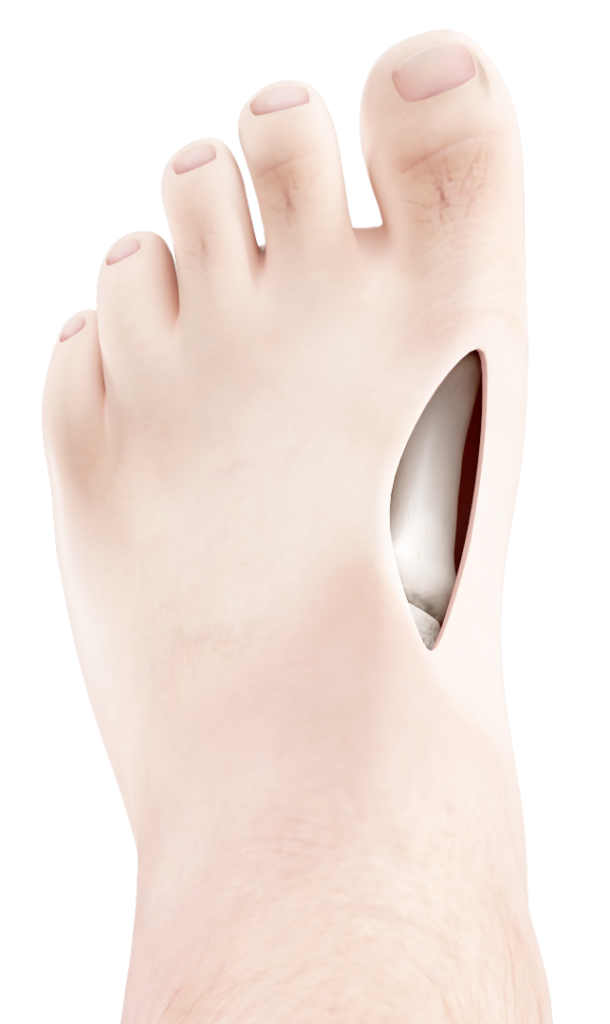
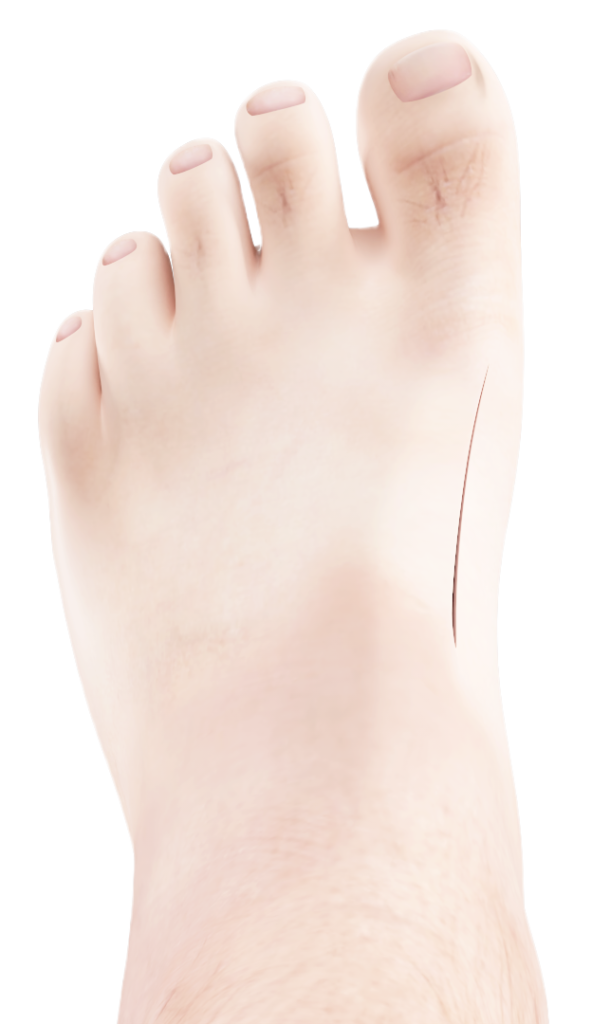
Guided Lapidus (Minimal Incision)
The Lapidus bunionectomy is a fusion of the midfoot to correct the bunion deformity.
An incision varying in size is made over the midfoot joint which is then cut and manipulated to restore the alignment of your big toe.
A combination of plates and screws are used to bridge the two bones together during the healing process.
PECAPLASTY BUNION CORRECTION
PECAPLASTY is a surgically guided 3D, or commonly referred to as a Tri-Planar, correction. Several 2mm incisions are made behind the big toe joint. The bone is then cut through the 2mm incision, and the PECAPLASTY is applied to correct the deformity and accurately place the implants to hold the correction during the healing process.
This procedure is indicated for mild to severe bunions, obtaining 3D tri-planar correction without disrupting mobility in the joint by fusing the midfoot.
*PECAPLASTY is indicated for patients with mild to severe bunion deformities. However, if arthritis is present or your bunion is too severe, your surgeon may determine a fusion is the best option for your recovery.
NO OPEN SURGERY

TINY INCISIONS
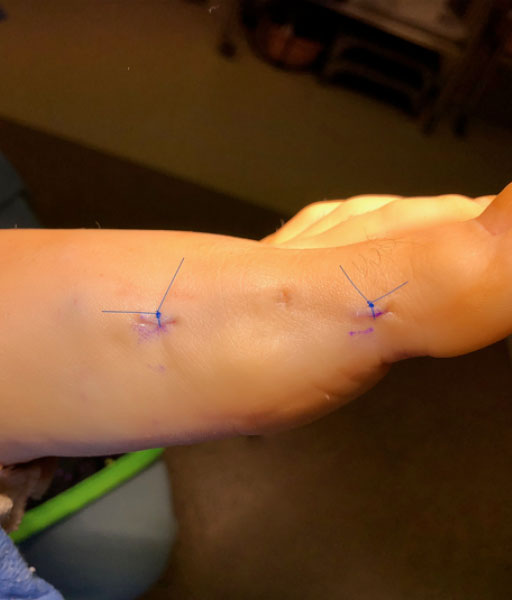
CENTROLOCK IMPLANT
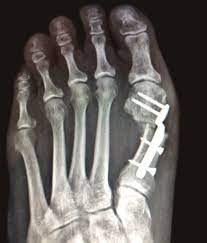
PECA IMPLANTS

PECAPLASTY and CENTROLOCK Advantages
FASTER
RECOVERY
Less soft tissue disruption allows for faster bone and soft tissue healing.
NO JOINT
FUSION
This decreases healing time and stiffness.
LESS
SCARRING
Due to tiny incisions.
NO PROMINENT
HARDWARE
Both PECAPLASTY and CENTROLOCK Implants are designed to stay within the bone without causing pain or being palpable under the skin.
| PECAPLASTY / CENTROLOCK | Guided Lapidus (Minimal Incision) | Lapidus | 2 Plane Correction | |
|---|---|---|---|---|
| Less pain & Rapid Recovery | ✔ | – | – | – |
| Keyhole Incision, Decreased scarring & cosmetic appearance | ✔ | – | – | – |
| Tri-planar correction (3D) | ✔ | ✔ | ✔ | – |
| Immediate weight bearing after surgery in a surgical shoe | ✔ | – | – | – |
| Immediate weight bearing Surgical Boot | – | ✔ | ✔ | – |
| Fuses a Healthy Joint to Correct Deformity | – | ✔ | ✔ | – |
TELL ME ABOUT BUNION SURGERY RECOVERY
First Weeks
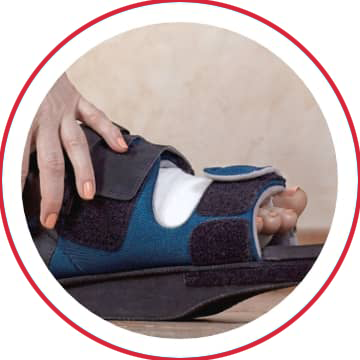
Immediate full weight bearing is possible immediately after surgery in athletic shoe wear or in a rigid flat orthopedic shoe, depending on your surgeon’s recommendation.
Next 4 – 6 Weeks
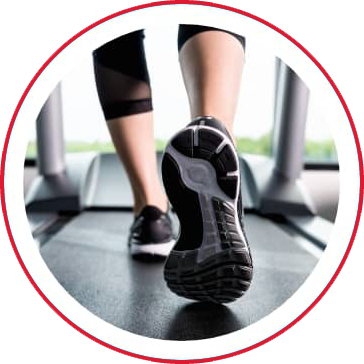
Transition to your own supportive shoe wear. You may begin stationary biking, walking for exercise, and elliptical.
At 3 Months

You may begin running and wearing heels, if desired.
At 4 – 6 Months

Resume most activities & return to normal shoe wear.

Lam P, Lee M, Xing J, Di Nallo M. Percutaneous Surgery for Mild to Moderate Hallux Valgus. Foot Ankle Clin N Am 2016; 21: 459-477 (data only with respect to chevron osteotomy procedure).
Lee M, Walsh J, Smith MM, Ling J, Wines A, Lam P. Hallux Valgus Correction Comparing Percutaneous Chevron/Akin (PECA) and Open Scarf/Akin Osteotomies. Foot Ankle Intl 2017; 38(8): 838-846 (data only with respect to chevron osteotomy procedure).
Maffulli N, Longo UG, Oliva F, Denaro V, Coppola C. Bosch Osteotomy and Scarf Osteotomy for Hallux Valgus Correction. Orthop Clin North Am. 2009 Oct;40(4):515-24, ix-x. doi:10.1016/j.ocl.2009.06.003.
